What is a B2B marketplace? What distinguishes them from other e-commerce websites? You need to puzzle out the nuances of this domain to hit it big.
At Codica, we have solid experience building marketplaces for various niches. We understand all the peculiarities of the process. Hence, we always do our best to identify the right target audience, value proposition, and core functionality for your B2B platform.
In this article, we will discuss what a business-to-business marketplace is, its types, features, and the main aspects of building a B2B marketplace.
B2B marketplace definition
A B2B (business-to-business) marketplace is a platform that connects businesses, such as a manufacturer or suppliers and wholesalers or retailers. B2B marketplaces enable businesses to buy and sell goods or services to each other more efficiently by providing a centralized platform where they can find and interact with potential trading partners.
At its core, a B2B marketplace is a highly profitable business widely popular all over the globe. Here are some reasons why.
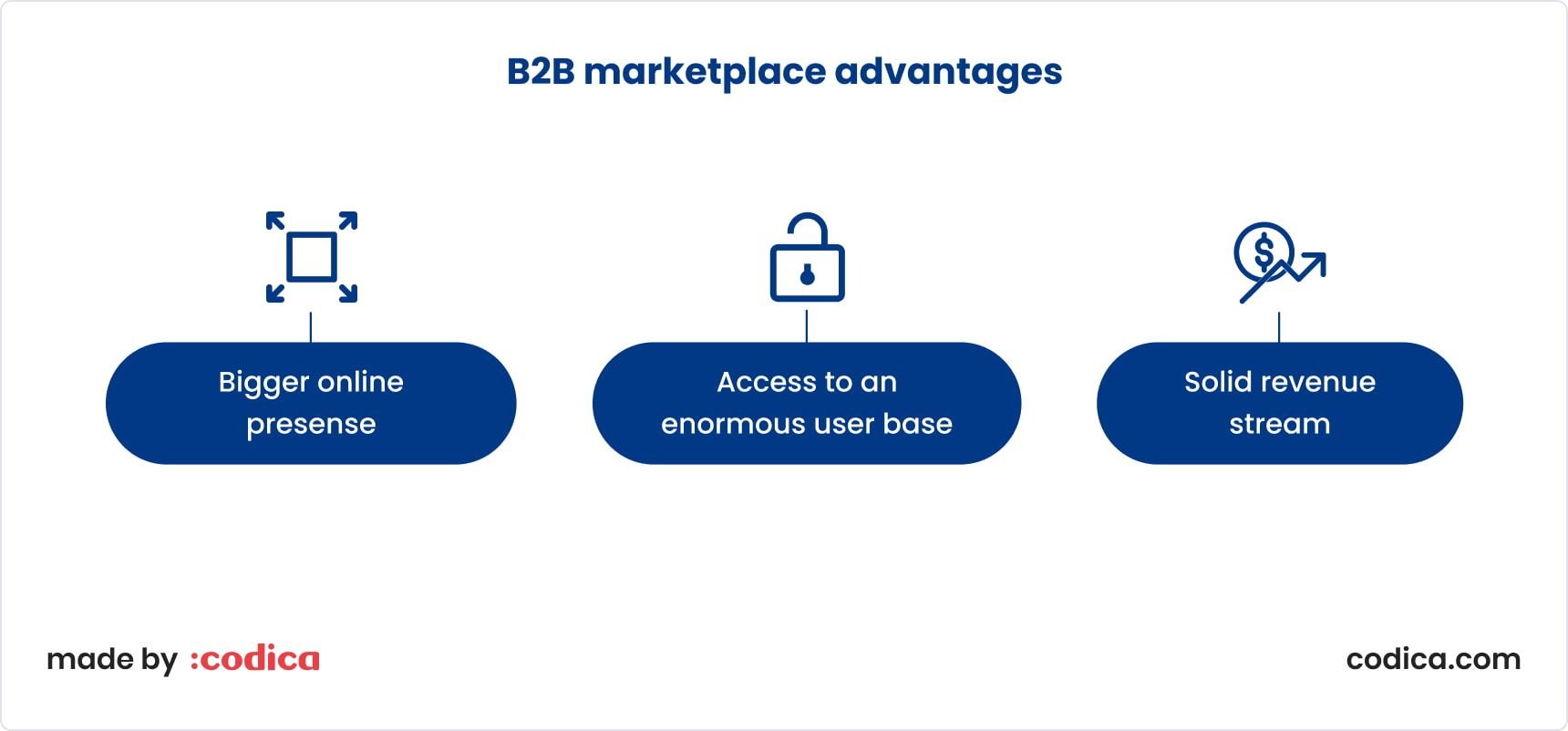
- Access to an enormous user base. A B2B marketplace is a vast platform that connects businesses, allowing you to reach a large and diverse customer base beyond your local market. With a wide range of products, you can attract even more potential customers.
- Solid revenue stream. B2B marketplaces have a huge potential for generating revenue. For instance, you can generate it with transaction and subscription fees, advertising, and value-added services.
- Bigger online presence. Typically, B2B marketplaces are huge aggregators that connect small businesses. Thus, creating a marketplace can greatly increase your online presence and help you reach an even wider audience.
Thus, B2B marketplaces can operate in various niches, including rentals, services, or products. However, there’s a significant difference between how single users and businesses (i.e., enterprise-level users) buy certain goods. B2B platforms are built to simplify complex transactions or bureaucracy. Ultimately, it’s one of the main factors distinguishing B2B from P2P (peer-to-peer) or B2C (business-to-consumer) businesses.
Types of B2B marketplaces
The classification of online B2B marketplaces is based not only on products and services offered but also on the type of delivery. In this section, we will explore some of the common types of B2B marketplaces, their unique features, advantages, challenges, and their respective examples.
Vertical marketplaces
These B2B marketplaces target specific industries or verticals. They connect buyers and sellers within an industry and offer specialized product catalogs, tools, and services that meet the industry's unique needs.
For example, VirtualExpo is a B2B marketplace that connects buyers and sellers across several industries, offering specialized product catalogs for specific equipment, devices, and supplies.
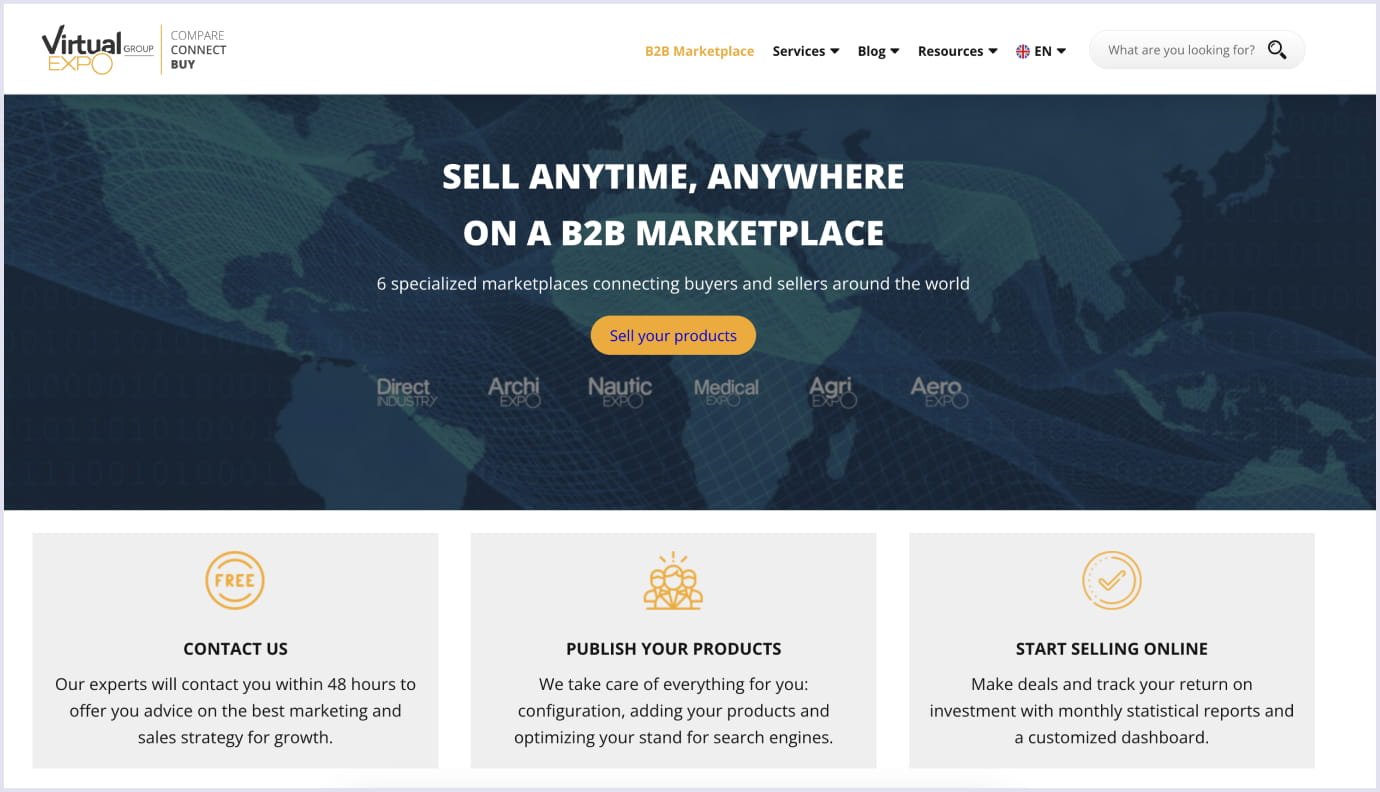
Horizontal marketplaces
These marketplaces cater to a wide range of industries and offer a variety of products and services. They are often more generalist and provide a platform for businesses to buy and sell everything from office supplies to raw materials.
Amazon Business is a suitable example. It offers business customers access to various products and services, from office supplies to industrial products.
Read also: Horizontal vs Vertical Marketplace: Examples & Benefits of Each Type
Procurement platforms
These platforms focus on streamlining the business procurement process. They offer tools and services that enable businesses to manage their purchasing activities, automate procurement workflows, and optimize spending.
Coupa is a great example. This platform offers tools for managing procurement spend, including analytics, supplier management, and invoice management.
Private marketplaces
These invitation-only marketplaces are typically operated by large corporations or buying groups. They offer a closed marketplace where approved suppliers can exclusively offer their products and services to the invited buyers.
Walmart Marketplace can surely be considered a private one. This invitation-only platform operated by Walmart offers approved suppliers access to its large customer base.
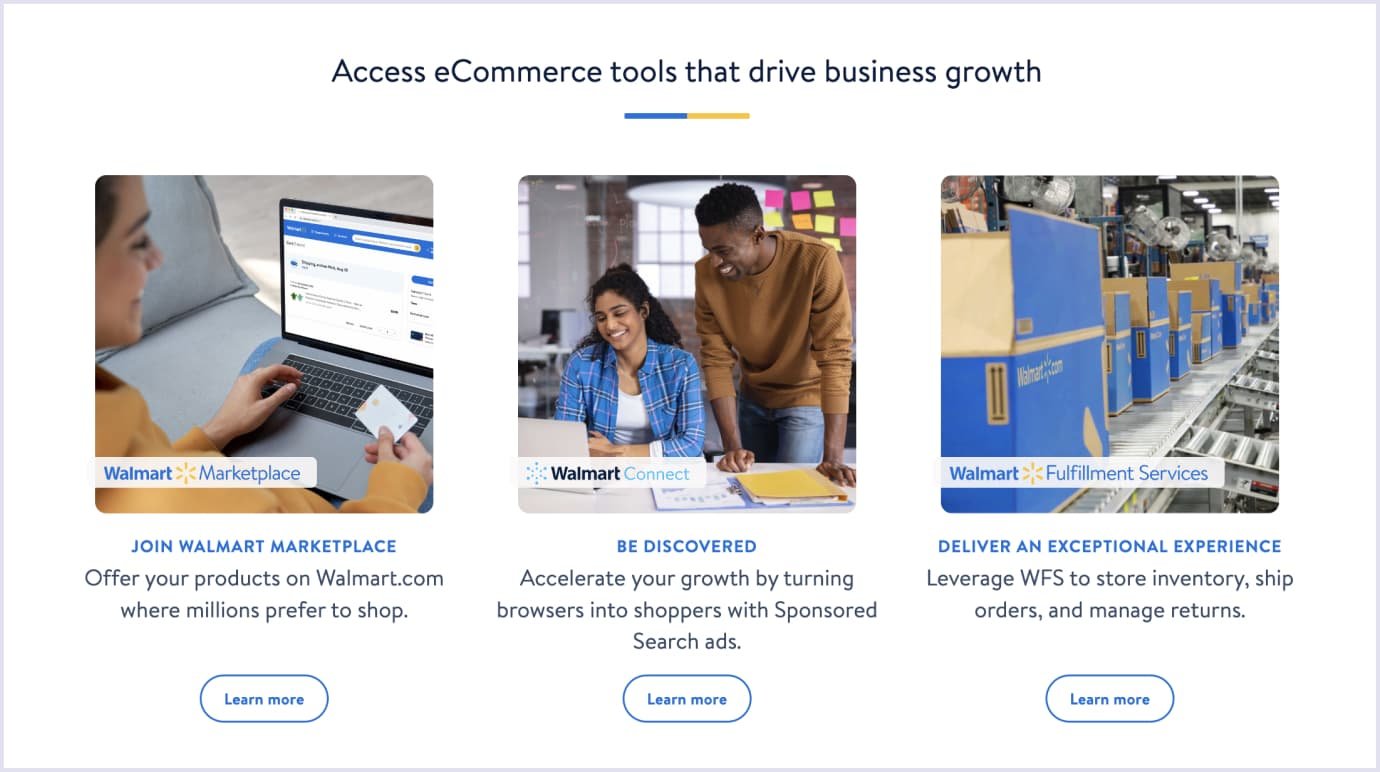
Hybrid marketplaces
These marketplaces combine elements of multiple marketplace types to cater to specific buyer and seller needs. For example, a hybrid marketplace may offer a vertical-focused product catalog with procurement and supplier discovery tools.
Zoro is a fitting example. It provides various products across various industries and offers procurement tools and features to help buyers manage their purchasing activities.
Supplier discovery platforms
These marketplaces help businesses discover new suppliers and partners. They offer features such as supplier directories, supplier ratings and reviews, and request-for-quote (RFQ) tools to help businesses find the right suppliers for their needs. Here’s an outline of supplier discovery platform processes:
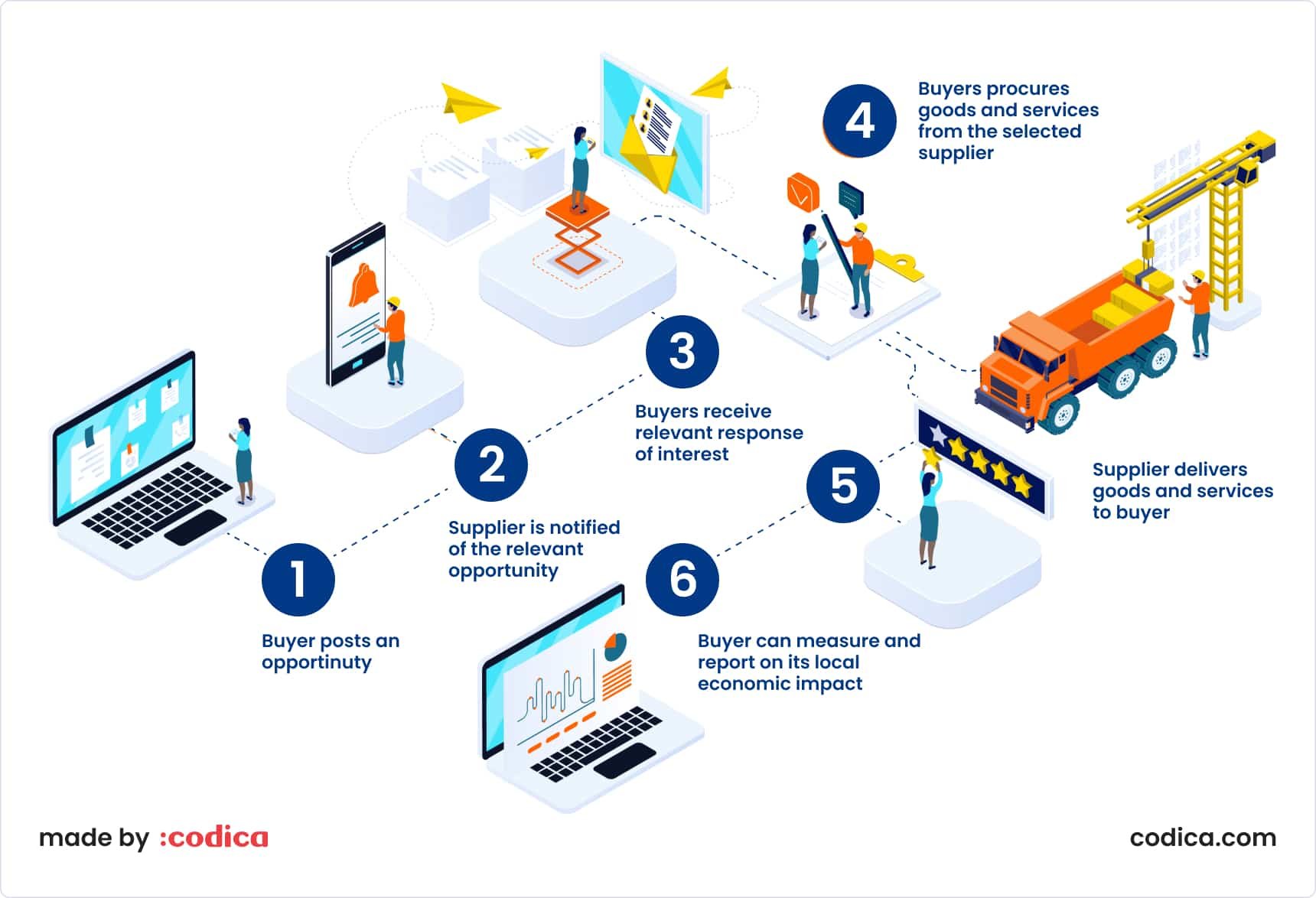
As an example, consider ThomasNet. It connects buyers with suppliers across various industries, offering a supplier directory and RFQ tools to help buyers find the right suppliers for their needs.

Main features of a B2B marketplace platform
Staying on top of the market is all about users’ comfort. If they are satisfied, then they will stick around. Hence, your B2B marketplace has to have several key features to keep your users engaged and satisfied. Let’s cover them next.
Implement third-party integrations
Allowing your customers to enhance their experience with plugins or tools is very beneficial. The bigger the choice pool people have, the more satisfied they will be. You can also expect more streamlined operational processes between businesses. For instance, you could integrate accounting software or inventory management solutions. Whatever it is, it will find its users.
Emphasize secure payments
Every marketplace involves a financial aspect that has to be as secure as possible. Speaking of B2B marketplaces, they operate in larger goods volume, enterprise-level ones. Accordingly, you must make sure your users are well-informed about the financial policy you have. Moreover, make sure you establish payment processing using a well-known, trustworthy firm like PayPal or Stripe.
Accent analytics with dashboards
Providing your customers with tools to monitor their performance is crucial. Implementing a neat dashboard where businesses can track their sales and amount of orders can greatly simplify their experience with your B2B platform. At Codica, we implement them in projects for e-commerce marketplace development, as we already know how convenient they are.
The custom e-commerce solution we built would be a handy example. Our client requested a multi-vendor marketplace platform that enables users to do many things using just one website. Employing our multi-vendor marketplace development services, we built a highly complex solution that comprises B2C and C2C (consumer-to-consumer) solutions.
This complex marketplace features numerous functionality perks. We thoroughly worked to make every detail count and be useful. For example, we developed a complex search system so that users never get lost on the site. For even more convenience, we added an interactive signup form with a questionnaire to make their journey predictable and valuable.
Another helpful addition was Stripe's convenient payment system. Marketplaces’ success depends heavily on security, so we made it seamless yet highly efficient.
Lastly, we know how vital the analytical aspect is in this matter. Hence, the flexible dashboards we designed and built allow users to track numerous metrics to see their business's overall performance.
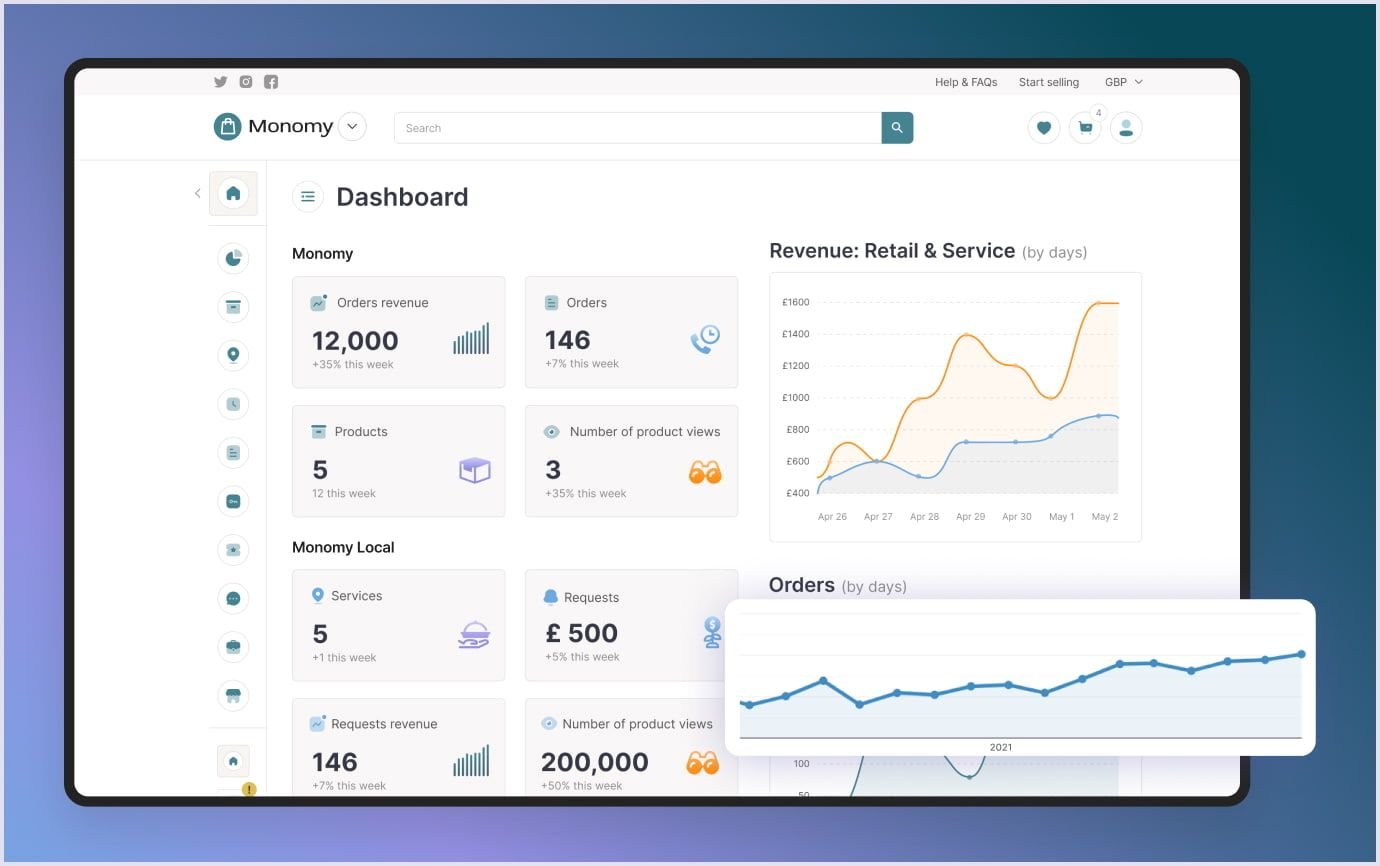
Offer messaging functionality
It is essential for the platform to allow two cooperating parties to communicate efficiently. Hence, you have to provide a messaging feature. It is also useful as people won’t need to leave your platform to communicate with other apps. Needless to say, it will simply increase retention and be a crucial improvement for your further success.
Make a user-friendly navigation
Today’s marketplaces offer so much that it is getting too easy to get lost. Thus, providing your users with thoughtful navigation is another step toward success. Luckily, modern approaches make it possible to create thousands of variations. For instance, you can implement breadcrumb navigation, add a simple search bar with many variables, or add a separate advanced search page.
B2B marketplace opportunities
It’s very important to pay attention to potential opportunities when you wonder how to build a B2B marketplace. With the constant market evolution, marketplaces also strive to bring something new to their audience. So, here are several opportunities we consider important in today’s B2B marketplace industry.
B2B processes need to be streamlined
Regarding B2C e-commerce platforms, any shopper’s request can be solved with one click.
That is not the case with business-to-business marketplaces. Large corporations still tend to rely on outdated or even archaic technologies. Their working environment is usually quite complex, making switching all their processes to a new platform or software difficult and costly.
Surely, they don't do this for anything. Stakes are too high, so trust must be ensured between parties. Still, owners of B2B multi-vendor marketplaces should find a way to streamline the steps of the transaction process. This way, its efficiency and productivity will be significantly increased.
The business-to-business domain remains the blue ocean
As a rule, new customer-oriented marketplaces already know their competitors. They tend to take cues from established platforms like Amazon or eBay and find creative ways to improve their offerings to gain the upper hand. As for online B2B marketplaces, there are many categories without a single predominant solution.
When you define an unoccupied niche or the so-called blue ocean, you can focus on finding a unique solution to a chicken-and-egg problem. Consequently, you have better chances of gaining a competitive edge in building network effects.
A B2B marketplace launch can improve the business’s offering
For established companies, starting an online marketplace is a good way to bring extra value to their offerings.
Moreover, you can build relations with your customers and improve their loyalty. Your ecosystem of third-party suppliers can meet various consumers’ demands at any stage of the customer journey.
As a result, establishing a marketplace on top of your business network is a winning decision. It will allow you to spread your share of the market and establish not only good but also evolving relations with customers.

Common B2B marketplace challenges
Apart from opportunities, this industry always has numerous challenges. So, let’s focus on the fundamental difficulties crucial for your business's success.
High complexity
The concept of B2B marketplaces is a highly complex topic. It involves extensive pre-development planning, programming skills, and advanced architectural design. This complexity sets the market entrance threshold quite high. Consequently, you must hire an extremely experienced software development company or have an in-house team of dozens of specialists.
Building long-term trust-based relations with clients
It is not a secret that gaining new customers can be cost-intensive. For this reason, maintaining good relations with existing consumers becomes a paramount concern for all businesses.
However, this task is entirely different for a business-to-business marketplace. Unlike B2C e-commerce platforms, online B2B marketplaces can survive with a small customer base and do not necessarily need to invent new strategies to attract new buyers.
Providing customers with exceptional user experience
Your B2B marketplace website should be user-friendly to generate a stable income. Although customers still tend to use desktop computers when placing an order, they start looking for the required products on mobile. Given that, mobile optimization of your website should become your top priority.
It would be a good idea to offer buyers self-service functionality. This way, you will make order management and real-time processing more convenient.
Remember that these processes should be accessible on all devices to establish a user-friendly experience.
Handling huge orders
If you create a B2B marketplace, prepare for bulk order delivery. Big companies are likely to place huge orders on your B2B wholesale marketplace.
How can you handle bulk orders? First, you can set up special discounts for such buyers. People buy products in large quantities to get a wholesale discount. So why deprive them of such an opportunity?
Also, creating a special landing page for wholesale purchases would not hurt. Provide users with all the required details to ensure trust in the bulk order system on your online B2B marketplace. However, offering such an option requires an advanced stock management system. Such novation must be carefully controlled to avoid issues with low stock, order cancellations, etc.
Payment gateways
The golden rule is to make the payment options convenient for customers. But there is more! You should also consider compliance with international legal and financial regulations.
Besides, the average order value of B2B marketplaces is often much higher than that of B2C or C2C marketplaces. That’s not to mention the specific payment methods used in each country and price fluctuations based on the number of items ordered.
For instance, while B2C customers are used to regular payment options, such as Apple or Google Pay, the transactional part of B2B businesses is more complex. Business-to-business companies often operate with invoices that are sent to the customer after the purchase is made. The customer then makes the payment either through a wire transfer, check, or online payment methods such as credit card or PayPal.
Many B2B companies also offer payment terms, which allow customers to pay for their purchases over some time if the purchase is pricey.
It’s worth noting that these factors may be the main reasons for the delays of days or weeks between purchases and payments.
Read also: How to Build Online Marketplace MVP and Not Fail
Most successful B2B marketplaces examples
Marketplaces are highly complex software solutions. So, by looking at the examples, you can learn a lot about suitable UI/UX design, payment solutions, and how to treat your audience. Below, we composed the list of the most successful marketplaces with an extensive audience, experience, and income.
1. eWorldTrade
This B2B marketplace tends to be one of the largest platforms for traders. Since the foundation, they have been carrying the idea of making trade easier at the global level. As of today, the marketplace caters to more than 500,000 customers while expanding its influence by connecting with new suppliers and manufacturers all over the globe.
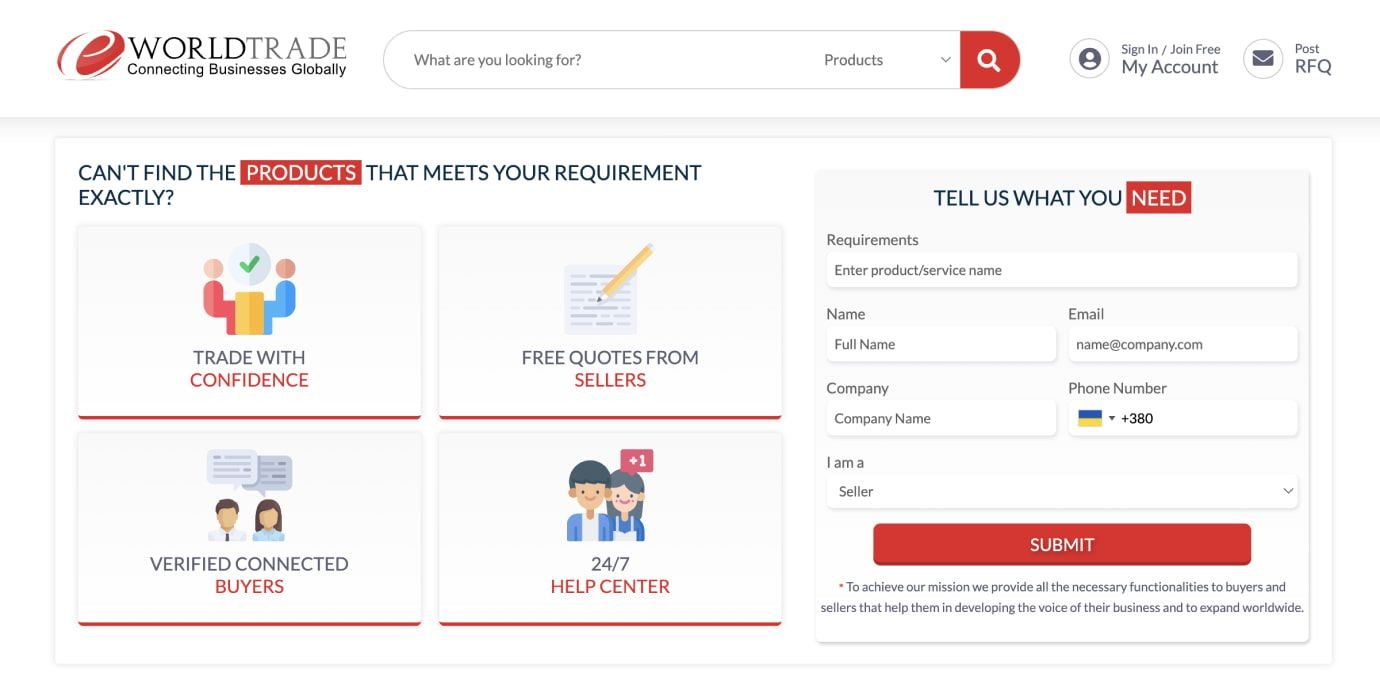
One of their greatest advantages is an interactive website that connects people. eWorldTrade not only connects buyers and suppliers for trading but helps them to build and maintain an everlasting relationship with a strong digital bond. As they claim, their strength lies in the broadest range of operations and global presence that allows to operate from multiple regions. They are fully versed in the latest functions and features to help businesses grow.
2. Alibaba
This marketplace has a big name in this industry. Being launched in 1999, it has grown a strong client base making it one of the biggest B2B marketplaces in the entire world.
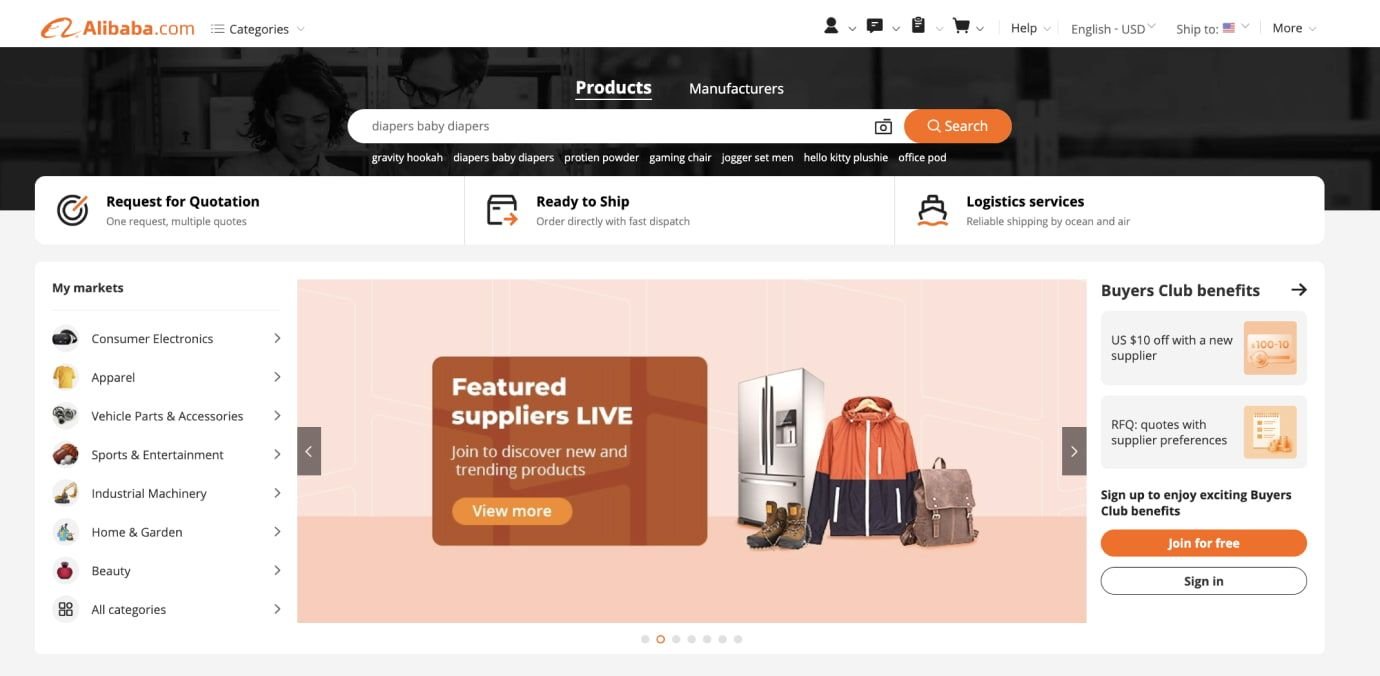
Nowadays, the Alibaba marketplace boasts more than 150+ million registered users and over 150,000 sellers. What’s more interesting, this B2B solution hosts nearly 10 million buyers, one-third of which are from the US.
3. Amazon Business
With more than $19 billion in yearly sales, Amazon Business is one of the biggest players in the B2B market. Being one of the biggest and most trustworthy marketplaces on the market, it powers 5+ million businesses all over the globe.
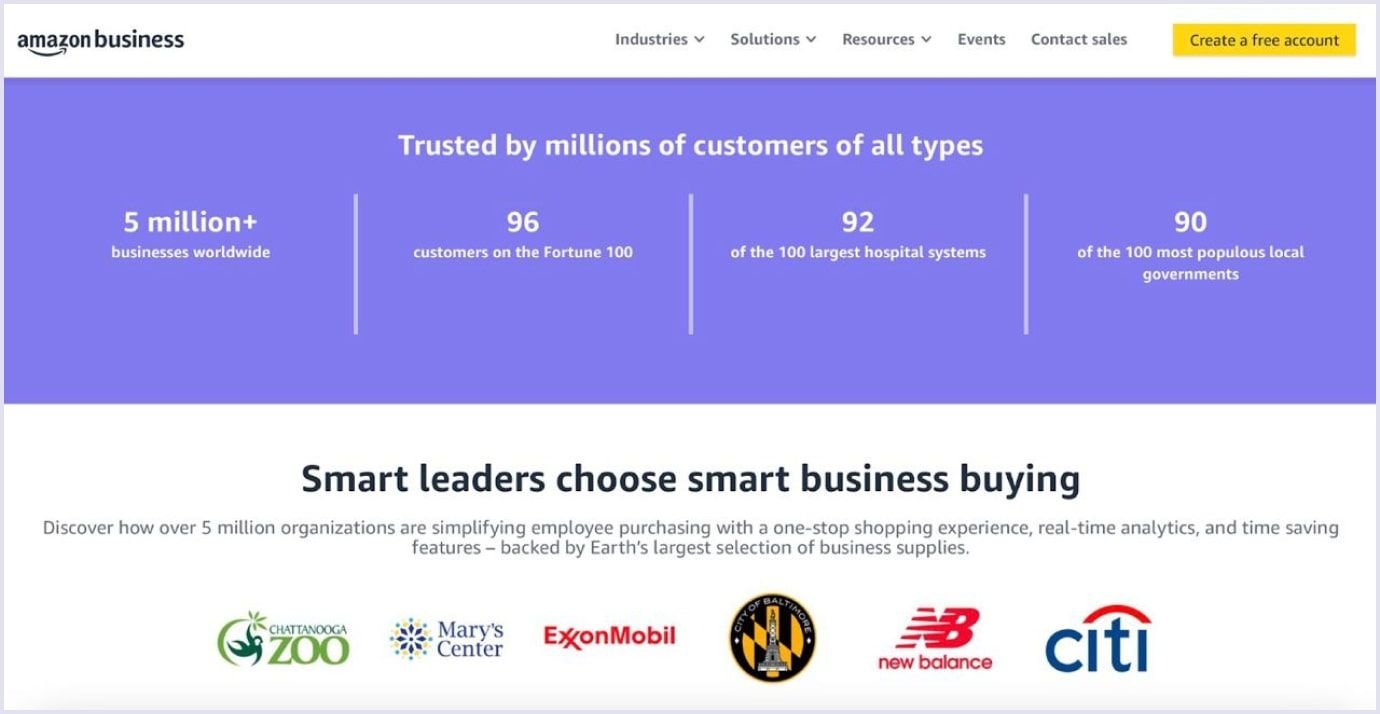
People choose it because of its great discounts policy. With the huge number of goods, Amazon Business effectively attracts customers by providing irresistible offers to newcomers.
4. Global Sources
This B2B platform that’s often treated as a bridge between the Asian and the Western market. One of their main features is a customer-centric approach, bringing them 1.5 million active buyers.
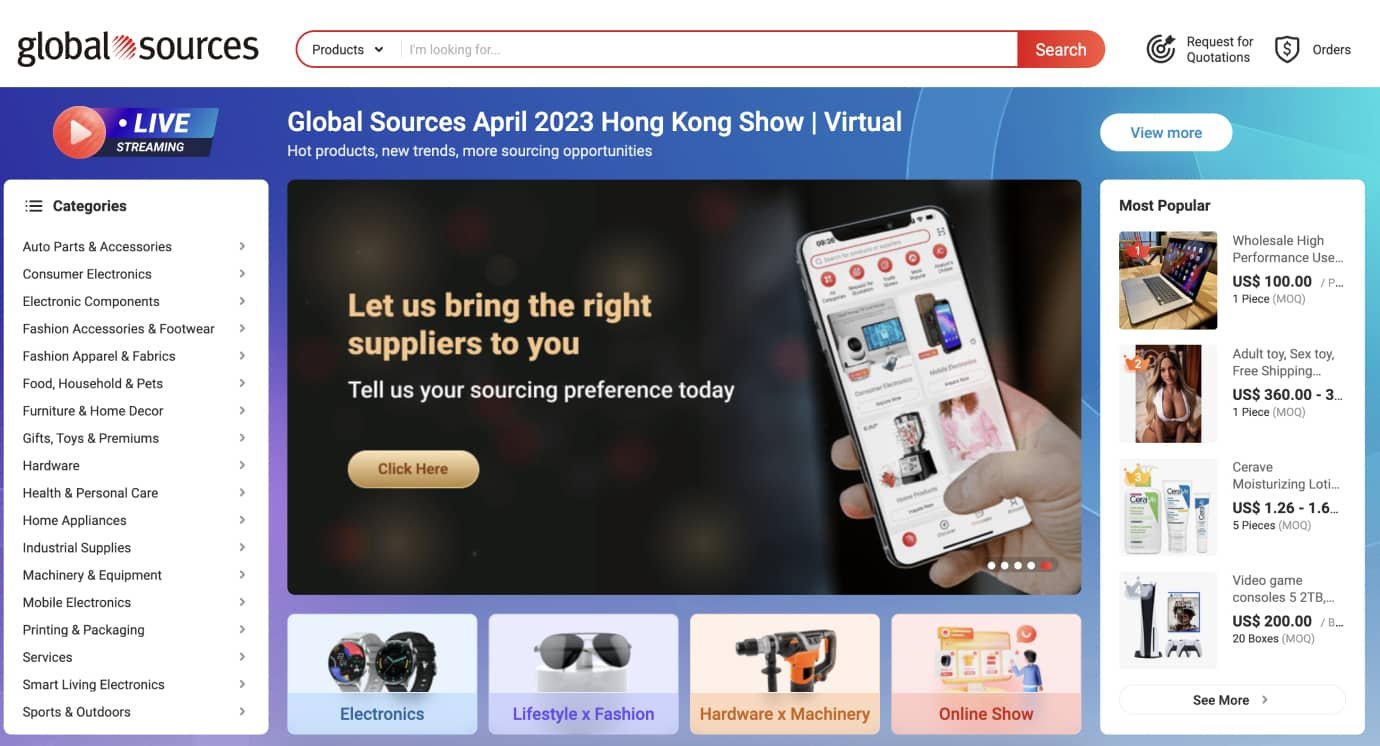
Cost of building a B2B marketplace platform
So, how much will it cost you to build a business-to-business e-commerce platform? We should admit that this is a tricky question. Nevertheless, we can provide you with a rough estimate.
Two factors influence the cost of developing a B2B marketplace: the development approach and the functionality you want to implement.
To make things easier, we created a table with the approximate cost of marketplace website development. You can see it below:
| How much does it cost to build a B2B marketplace? | ||
| Features | Time, hours | Cost ($50/h) |
| Design | ||
| UX Development | 64 | $3,200 |
| UI Development | 96 | $4,800 |
| Architecture | ||
| Project setup | 16 | $800 |
| DB structure | 32 | $1,600 |
| Integrations | ||
| Payment (Stripe or PayPal) | 64 | $3,200 |
| Shipment (Shippo) | 32 | $1,600 |
| Main functionality | ||
| Authorization and Security | 72 | $3,600 |
| User Profiles | 42 | $2,100 |
| Homepage | 64 | $3,200 |
| Search and filters | 72 | $3,600 |
| Product page | 42 | $2,100 |
| Reviews & Ratings | 48 | $2,400 |
| Checkout | 64 | $3,200 |
| Notifications | 32 | $1,600 |
| Inventory management | 42 | $2,100 |
| Buyer panel | 120 | $6,000 |
| Vendor panel | 156 | $7,800 |
| Admin panel | 120 | $6,000 |
| Non-development activity | ||
| Project management | 64 | $3,200 |
| Quality assurance | 96 | $4,800 |
| Code review | 48 | $2,400 |
| Total | 1418 | $70,900 |
So, based on an average hourly rate of $50, the approximate cost of a B2B marketplace platform can be around $70,900 if you partner with a development agency in Eastern Europe.
Related reading: How Much Does It Cost to Build a Marketplace Website in 2024
How can Codica help with B2B marketplace development?
Since 2015, the Codica team has provided online marketplace development services for various industries. All solutions delivered are optimized to bring significant traffic and increase conversions and sales.
Our vast experience proves that the focus on end-users is the key to the success of your B2B marketplace business. For this reason, we carefully study your potential customers, their preferences, and their expectations. We apply the latest UI and UX design services to deliver visually appealing and engaging solutions.
Benefits of B2B marketplace development with Codica
Choosing the right development partner for your B2B marketplace is crucial to its success. At Codica, we have extensive experience developing B2B marketplaces that meet the unique needs of businesses across various industries. Our expert developers and designers work closely with clients to deliver tailored solutions that drive growth and enhance efficiency. Let’s explore the crucial benefits of choosing Codica for your B2B marketplace development needs:
- Combination of practicality and efficiency. We aim to create a centralized platform for buyers and sellers to conduct business with streamlined procurement, supply chain management, and order fulfillment processes. As a result, we deliver platforms with faster turnaround times, reduced costs, and increased productivity for both your company and your customers.
- Adjustable and custom dashboard. By tailoring the platform to your company's unique requirements, we build the analytical aspect of the marketplace to provide the functionalities and features needed to run your business effectively. Consequently, with the thoughtful admin panel, you can offer a personalized experience to your customers, increasing their satisfaction and loyalty to your brand.
- Custom functionality and third-party tools. For example, we have solid expertise in integrating payment gateways or customer relationship management (CRM) software to automate and simplify key business processes. This can save your company time and resources while providing a better customer experience.
- Advanced security measures. At Codica, our approach includes encryption to protect sensitive data, two-factor authentication to prevent unauthorized access, regular security audits to identify vulnerabilities, and SSL certificates to secure online transactions.
- SEO-friendly orientation to increase conversions. Our approach includes optimizing site structure, creating high-quality, unique content, using targeted keywords and meta tags, and ensuring mobile-friendliness. We also conduct thorough keyword research to identify each marketplace's most relevant and valuable search terms.
Case studies of marketplace development from Codica
For the past three years, we assisted and built about 10 different marketplaces varying in specifications and niches. We are proud to be the leading development company on these projects. Let’s take a closer look at several examples.
Dan
It is a marketplace for trading domain names aiming at delivering the best quality service in trading digital goods. Thanks to our website redesign services, the platform became faster, more robust, and highly performant, allowing users to browse endless possibilities.
While working on the marketplace, we made an accent on the design and a very thoughtful user experience. We made sure users’ navigation through the site is as comfortable as possible.
Trade A Boat
In the boating domain, Trade A Boat is Australia’s favorite platform for selling or buying marine equipment. We redesigned the product, improving its UI/UX aspect, adding more functionality, and making it robust and performant.
As a result, we extended this marketplace, making a progressive web app compatible with all mobile devices and the desktop version. Another essential emphasis was made on SEO optimization, a convenient search system, an advertisement system, and so much more! As a result, our partnership with Celso and his professional team was as efficient as possible.
Moreover, you can explore our portfolio of cutting-edge software solutions tailored to elevate your business.
Conclusion
To sum up, B2B marketplaces have transformed how businesses transact with one another. These digital platforms have simplified the buying and selling process, enabling buyers to find the best deals and vendors to reach a broader audience. B2B marketplaces offer many advantages, including improved efficiency, cost savings, and access to global markets.
Nevertheless, companies must carefully evaluate the available marketplaces and select those that align with their unique requirements. As e-commerce continues to grow, B2B marketplaces are expected to become even more crucial, emphasizing the need for companies to grasp their potential and utilize them effectively to achieve growth and success.
If you need help starting your B2B multi-vendor marketplace, please contact us. We will willingly deliver a fast-loading and scalable custom platform your users will love.

